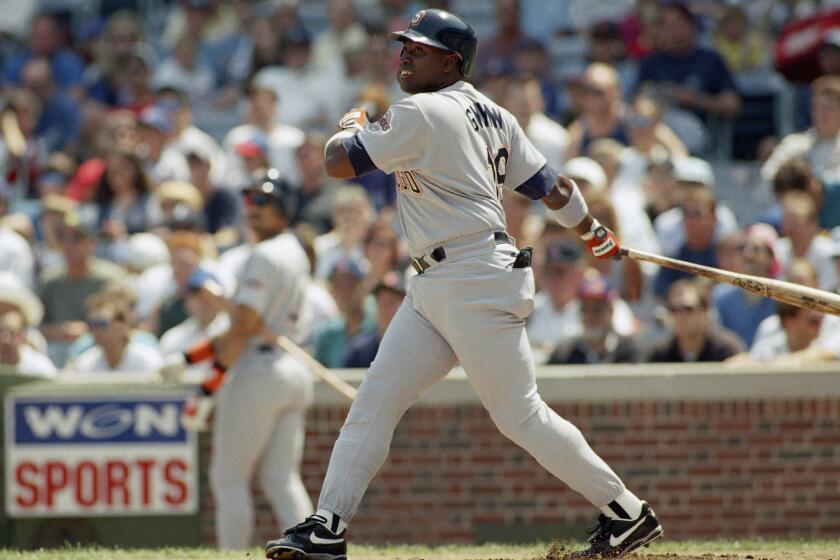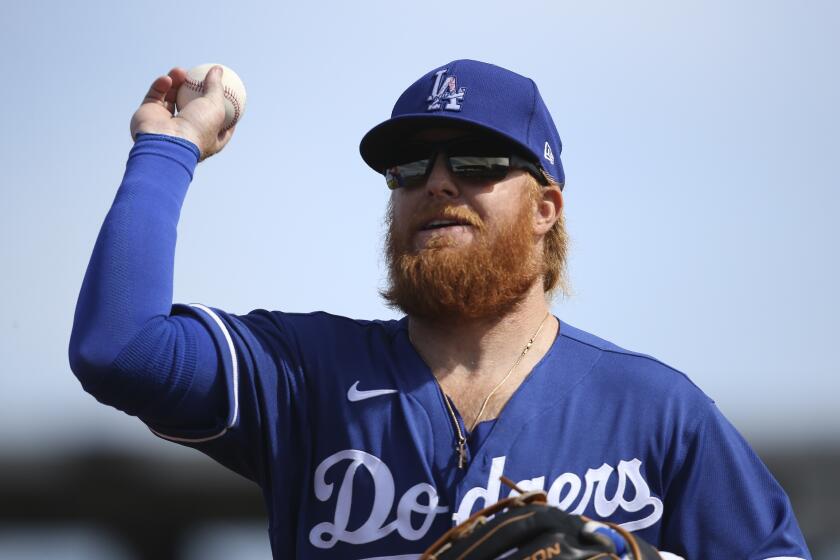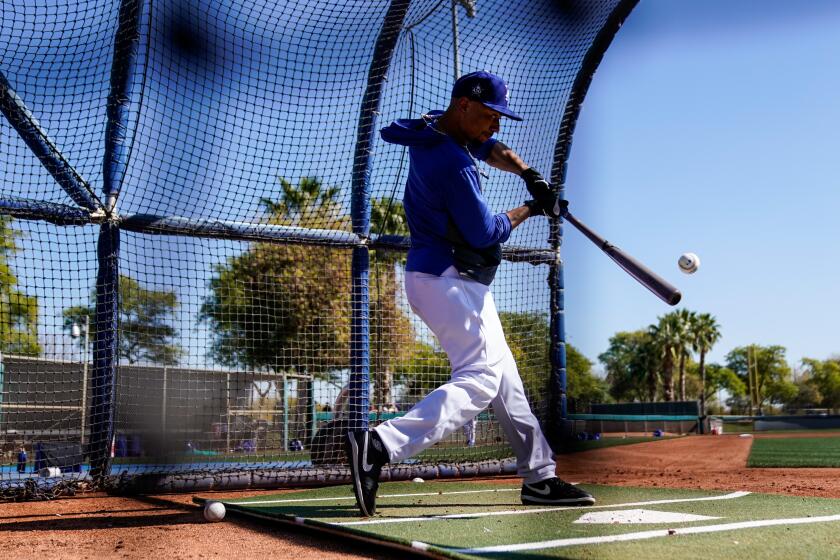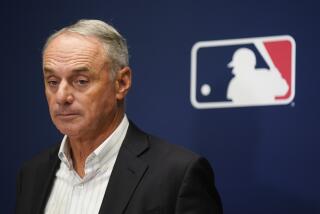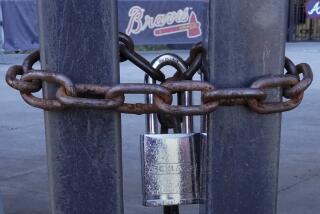Will there be an MLB season? Here’s what the players and owners must resolve

- Share via
Scott Boras sounded a bit hoarse when he picked up the phone Sunday. He‘d been talking with players all weekend, strategizing the next two weeks that could determine whether there is a baseball season in 2020.
Those weren’t the only conversations he’s had recently. His agency’s Twitter account, for eight years used to offer condolences and share charitable endeavors, has been transformed in the last two months to promote Boras’ appearances on CNBC, MSNBC, NBC Sports Network, ESPN Radio, CBS Sports Radio, Fox Sports Radio and MLB Network Radio.
Boras says he is speaking to fans. As elected officials from President Trump to New York Gov. Andrew Cuomo say the time has come to play ball, Boras is well aware players likely would shoulder the blame if they cannot reach a financial agreement with owners for a 2020 season. The owners say the players need to compromise on salary, and several decorated players have publicly wondered why.
“I want fans, when they think about what players are doing and why, to understand,” Boras said. “They have compromised.”
Dodgers manager Dave Roberts and San Francisco Giants manager Gabe Kapler answer questions on how they set their lineups for ‘the Golden Greats: I-5 Series.’
Boras is a player advocate. When he says players have compromised, is he correct?
In March, owners and players agreed that salaries would be prorated for any games played this season. To play roughly 50% of the season, as owners have proposed, would require a 50% pay cut.
So what’s the issue?
The agreement also commits owners and players to negotiate in good faith about the economic feasibility of playing games without fans. The owners say they need additional pay cuts because they would lose more money by playing games without fans than by not playing at all. The players do not believe that and, in any case, say the owners can decide whether to play based on the salaries to which they agreed.
Would the owners really decide not to play?
They would rather play. The majority of national television money comes from the postseason, which the owners propose to expand, starting this year.
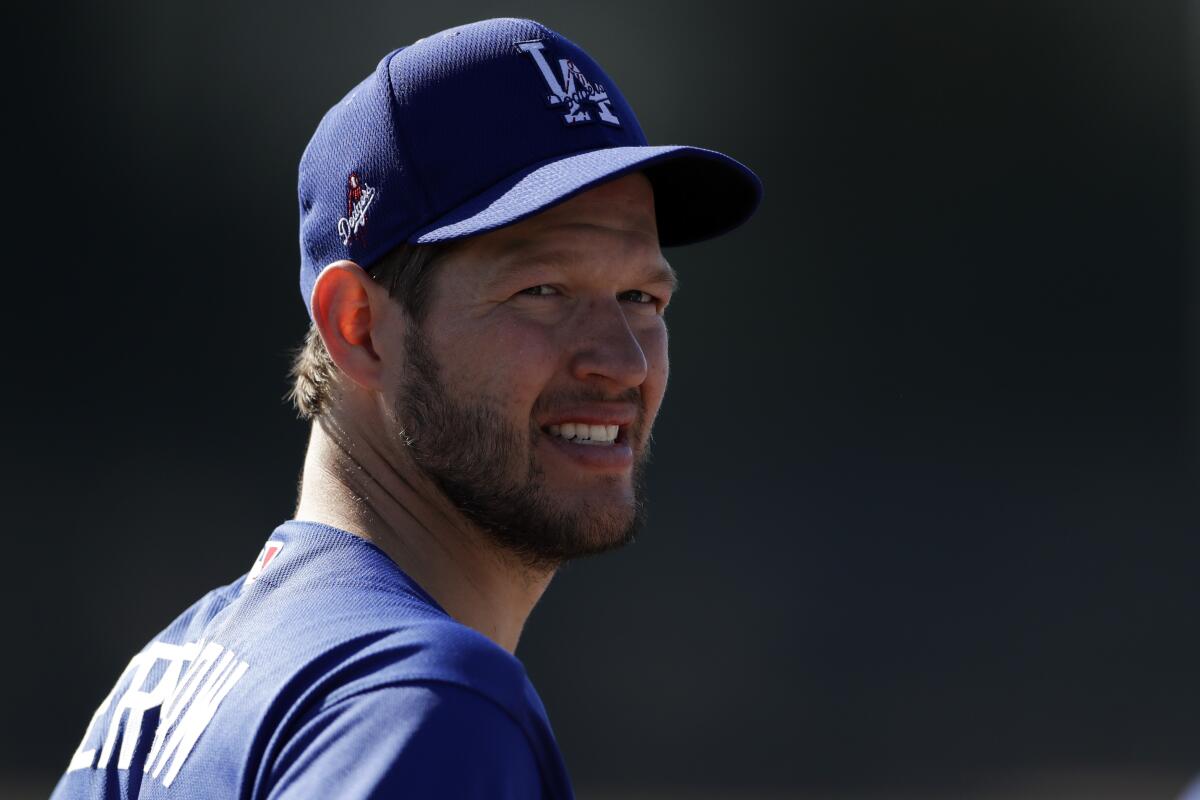
That should give the players some leverage, right?
The players had little to no leverage heading into the next round of collective bargaining. The owners have manipulated the current labor agreement into a de facto salary cap and have taken advantage of analytic insights to emphasize younger and cheaper players. Now, finally, the owners say they need something from the players.
So why not broaden these negotiations and get the next collective bargaining agreement done as well?
No one knows what the economics of baseball might be when the current labor deal expires after the 2021 season. Do fans come back to the ballpark, and if so, how many will be allowed? Does the acceleration of cord-cutting during the pandemic mean baseball teams can no longer count on ever-rising riches from regional sports networks? How valuable are streaming rights? Without those answers, either side would risk making a foolish deal — and the union cannot risk another one.
So the owners still need something from the players this year. What do the owners propose?
The owners initially floated a 50-50 split of revenues, for this year only. With the uncertainty of whether crowds of any size might be permitted by October, the owners thought, why not share in the upside or the downside?
Sounds fair. Did the players like that concept?
No, they hated it. Revenue sharing is anathema to the union, which believes there is a slippery slope from revenue sharing to a salary cap. More importantly, it could take months of forensic accounting for both sides to determine and define revenue.
‘Revenue’ is defined as ‘money’
Yes, but calculating revenue is complicated. Recall former Dodgers owner Frank McCourt. He split the Dodgers into a baseball company, a stadium operating company and a parking lot company — and then he charged the Dodgers rent to play in their own stadium. McCourt sold the team and stadium to Guggenheim Baseball Management, which set up another company to own the Dodgers’ local television rights.
What’s the Dodgers’ revenue? Depends how it is defined.
The MLB draft will be just five rounds and held virtually. Undrafted players can’t sign for more than $20,000, meaning many likely won’t turn pro for now.
The players don’t want revenue sharing. The owners want more pay cuts. What happens next?
The players asked the owners to share documents to back up claims of potential financial doom without pay cuts. The owners delivered some, but not all, of the requested documents.
On Tuesday, owners are expected to deliver a financial proposal that would not depend upon revenue sharing. The union is expected to suggest that, if the issue is reduced cash flow, players would be amenable to deferred salaries.
Whatever the union might request in exchange for another pay cut this year — a minimum payroll for 2021, say, or the elimination of draft picks as free-agent compensation next winter — might not fly among players who might lose out now. Tony Clark, the union chief, has publicly promised his players that negotiation about 2020 salaries “is over.”
Since the players’ share of postseason money is limited to a percentage of gate revenue, a fan-free postseason could mean yet another pay cut for playoff participants — or a start in bridging the difference between the parties.
Would the players really decide not to play?
They would rather play. No 2020 season means players get only a collective 4% of their previously guaranteed salaries. No 2020 season also would increase the likelihood of discounting current broadcast deals, which could lead to significant salary depression for years.
By playing ball this season, California could save $45 million in “jock tax” revenue.
Have players and owners agreed on how to keep everyone safe from the coronavirus?
No, but that negotiation is further along. Nothing can be risk-free. Players would rather not be quarantined apart from their families, and they hope daily testing could allow them to play something that more closely resembles a baseball game than a social distance festival.
In this joyful clip from the South Korean league, players cluster and hug after a walkoff grand slam. Also, at those fan-free games, note that teams sell ad space on the tarps that cover seats. MLB owners could make money that way too.
Teams have started to open their training facilities so that players can work out there. Is a deal imminent?
No, but there is little time if the parties hope to begin a second spring training in mid-June and the season in early July. The later the start, the fewer the games in an already abbreviated season, and fewer games means less money for everyone.
What is the worst-case scenario?
A coronavirus outbreak among the teams, despite health and safety protocols. Besides that? The NBA, back on the court in late July, with MLB blowing its chance to become the first major sport to return. It would be devastating for baseball if basketball’s billionaire owners and millionaire players could strike a deal, but baseball’s billionaire owners and millionaire players could not.
More to Read
Go beyond the scoreboard
Get the latest on L.A.'s teams in the daily Sports Report newsletter.
You may occasionally receive promotional content from the Los Angeles Times.

